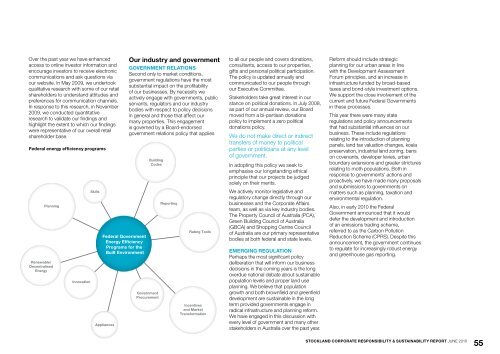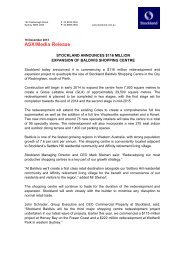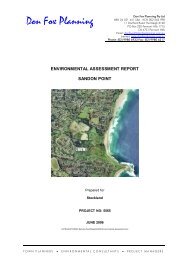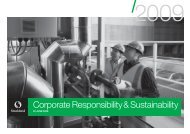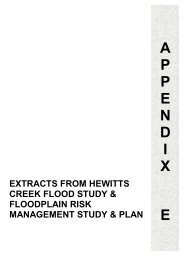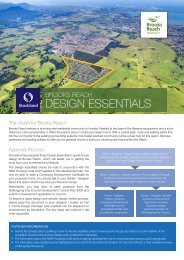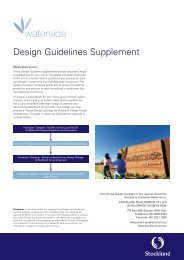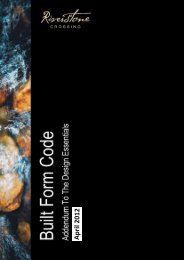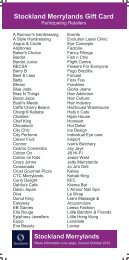Download PDF - Stockland
Download PDF - Stockland
Download PDF - Stockland
You also want an ePaper? Increase the reach of your titles
YUMPU automatically turns print PDFs into web optimized ePapers that Google loves.
Over the past year we have enhanced<br />
access to online investor information and<br />
encourage investors to receive electronic<br />
communications and ask questions via<br />
our website. In May 2009, we undertook<br />
qualitative research with some of our retail<br />
shareholders to understand attitudes and<br />
preferences for communication channels.<br />
In response to this research, in November<br />
2009, we conducted quantitative<br />
research to validate our findings and<br />
highlight the extent to which our findings<br />
were representative of our overall retail<br />
shareholder base.<br />
Federal energy efficiency programs<br />
Planning<br />
Renewable/<br />
Decentralised<br />
Energy<br />
Innovation<br />
Skills<br />
Federal Government<br />
Energy Efficiency<br />
Programs for the<br />
Built Environment<br />
Appliances<br />
Our industry and government<br />
Government relations<br />
Second only to market conditions,<br />
government regulations have the most<br />
substantial impact on the profitability<br />
of our businesses. By necessity we<br />
actively engage with governments, public<br />
servants, regulators and our industry<br />
bodies with respect to policy decisions<br />
in general and those that affect our<br />
many properties. This engagement<br />
is governed by a Board-endorsed<br />
government relations policy that applies<br />
Building<br />
Codes<br />
Government<br />
Procurement<br />
Reporting<br />
Rating Tools<br />
Incentives<br />
and Market<br />
Transformation<br />
to all our people and covers donations,<br />
consultants, access to our properties,<br />
gifts and personal political participation.<br />
The policy is updated annually and<br />
communicated to our people through<br />
our Executive Committee.<br />
Stakeholders take great interest in our<br />
stance on political donations. In July 2008,<br />
as part of our annual review, our Board<br />
moved from a bi-partisan donations<br />
policy to implement a zero political<br />
donations policy.<br />
We do not make direct or indirect<br />
transfers of money to political<br />
parties or politicians at any level<br />
of government.<br />
In adopting this policy we seek to<br />
emphasise our longstanding ethical<br />
principle that our projects be judged<br />
solely on their merits.<br />
We actively monitor legislative and<br />
regulatory change directly through our<br />
businesses and the Corporate Affairs<br />
team, as well as via key industry bodies.<br />
The Property Council of Australia (PCA),<br />
Green Building Council of Australia<br />
(GBCA) and Shopping Centre Council<br />
of Australia are our primary representative<br />
bodies at both federal and state levels.<br />
Emerging regulation<br />
Perhaps the most significant policy<br />
deliberation that will inform our business<br />
decisions in the coming years is the long<br />
overdue national debate about sustainable<br />
population levels and proper land use<br />
planning. We believe that population<br />
growth and both brownfield and greenfield<br />
development are sustainable in the long<br />
term provided governments engage in<br />
radical infrastructure and planning reform.<br />
We have engaged in this discussion with<br />
every level of government and many other<br />
stakeholders in Australia over the past year.<br />
Reform should include strategic<br />
planning for our urban areas in line<br />
with the Development Assessment<br />
Forum principles, and an increase in<br />
infrastructure funded by broad-based<br />
taxes and bond-style investment options.<br />
We support the close involvement of the<br />
current and future Federal Governments<br />
in these processes.<br />
This year there were many state<br />
regulations and policy announcements<br />
that had substantial influences on our<br />
business. These include regulations<br />
relating to the introduction of planning<br />
panels, land tax valuation changes, koala<br />
preservation, industrial land zoning, bans<br />
on covenants, developer levies, urban<br />
boundary extensions and greater strictures<br />
relating to moth populations. Both in<br />
response to governments’ actions and<br />
proactively, we have made many proposals<br />
and submissions to governments on<br />
matters such as planning, taxation and<br />
environmental regulation.<br />
Also, in early 2010 the Federal<br />
Government announced that it would<br />
defer the development and introduction<br />
of an emissions trading scheme,<br />
referred to as the Carbon Pollution<br />
Reduction Scheme (CPRS). Despite this<br />
announcement, the government continues<br />
to regulate for increasingly robust energy<br />
and greenhouse gas reporting.<br />
<strong>Stockland</strong> Corporate Responsibility & Sustainability Report June 2010<br />
55


